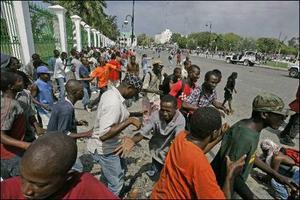The food we eatCurbing price speculation to prevent food riots
Global food prices are hitting record highs in part due to environmental disasters and increased financial speculation; to secure food supplies and prevent riots, agriculture ministers are proposing regulations on agricultural speculation; world food prices rose 25 percent last year while the price of grain has soared 79 percent; in 2008 sharp increases in food prices sparked riots and political instability in thirty countries including Egypt and Haiti

Food riot in Haiti in 2008 // Source: totheroots.wordpress.com
As global food costs hit record highs, the United Nations is seeking to limit speculation in agricultural markets to prevent food shortages and riots.
According to Bloomberg, after a meeting of forty-eight agricultural ministers in Berlin on 22 January 2010, French Agriculture Minister Bruno Le Mairewarned that there is a risk of more food riots unless surging prices are contained.
In the last year alone, world food prices rose 25 percent and countries spent more than $1 trillion on food imports. Increases in food costs have hit poor nations the hardest as they have spent as much as 20 percent more on food than in 2009.
In the last twelve months global benchmarks on wheat trading prices rose 65 percent, while corn increased 79 percent and soybeans leapt 50 percent.
Increases in prices were due largely to environmental factors that have devastated global crop production. In Russia wheat prices soared in 2010 to their highest peak since 1973 after experiencing its worst drought in at least fifty years. Canada was hit by extensive flooding that caused an estimated 15 percent decline in wheat production last year, while countries across Europe and South America faced droughts of their own that hampered agricultural yields.
Governments around the world, especially China, are bolstering their food supplies by limiting sales, increasing production, or releasing stockpiles to curb inflation and prevent riots.
The forty-eight agricultural ministers issued a joint statement after their meeting saying that they were “concerned that excessive price volatility and speculation on international agricultural markets might constitute a threat to food security.”
To ensure food security, agriculture ministers are proposing that G-20 nations regulate the “financial-agricultural” markets by placing limits on prices and the scale of trading positions.
Other proposals include increasing transparency by disclosing agricultural commodity trading which will help “eliminate those who conduct these transactions only to speculate and make short-term profits, without really having the goods being traded,” said Dacian Ciolos, the European Union’s agriculture commissioner.
According to Le Maire, increased investor speculation has also contributed to surging prices in food markets.
“We determinately reject speculation that leads to the ruin of farmers and an unstable situation in emerging countries,” he added.
The recent riots and political instability in Algeria and Tunisia were, in part, caused by rising food costs, while sharp rises in food prices in 2008 sparked protests and riots in more than thirty countries, including Egypt and Haiti.
Le Maire warned that, “We’ll see [food shortages and riots] again in 2011 or 2012 if we fail to quickly take the necessary measures.”
